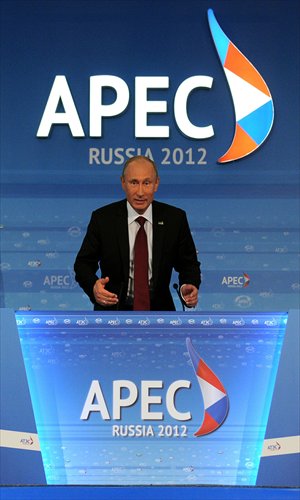The bear returns

It is not just a summit, but more like a declaration of Russia's return to the Pacific.
Russia's far eastern city Vladivostok, which means "to rule the east," gathered leaders from the Asia-Pacific Economic Cooperation (APEC) group in over the past weekend.
Although it is the first APEC summit held in Russia since it was admitted to the regional forum 15 years ago, the awakening bear, which was not often seen as a Pacific power after the breakup of the Soviet Union, is eager to show the world its potential and resolve in asserting itself as an Asia-Pacific power.
"Peter the Great opened the door of Europe three centuries ago by founding the city St. Petersburg. And today, we hope the APEC summit in Vladivostok will open Russia's window to the Asia-Pacific region," said Gleb Ivashentsov, deputy director of the Russian APEC Study Center.
"Russia is not satisfied by only waving its flag in the Pacific. We must project Russia's great economic cooperation potential to people from other countries in the region."
The bear's agenda
The priorities chosen by Russia for its chairmanship - trade and investment liberalization, regional economic integration, food security, reliable supply chains, and innovative growth - are well in line with the forum's established agenda.
"The agenda suggests that Moscow respects the conventional APEC spirit of caring for the region's economic wellbeing, rather than the complexity of political disputes in the region," said Vladimir Petrovskiy, a political analyst at the Far East Institute of the Russian Academy of Sciences.
For the time being, Russia's economy can offer very few attractions to foreign investment beyond natural resources: energy, minerals and forests. But this will not always be the case in the future, the Russians believe.
Russia has a great quantity of uncultured arable land and fresh water resources in the Far East region. Catering to the growing demand for foods in Asia, Russia plans to double its food exports within 15 years.
The country is also eyeing the logistical benefits from its geographical advantages.
Russian Railways chief Vladimir Yakunin asked President Vladimir Putin last month to spend $10 billion over the next three years to upgrade the country's century old Trans-Siberian railroad, according to the VOA.
And the country is pushing for the Northern Sea Route, a main shipping route in the Arctic that skirts Russia's northern coast and links European and East Asian ports. The distance could be more than a third shorter than the traditional one.
More importantly, the Russian federal government created the Ministry for Development of Russian Far East earlier this year to implement the state programs.
"A summit is not enough. Russia will continue to follow up all the trade and investment indexes at the minister level in the following six months," Petrovskiy said.
The bear's strategy
There is a widespread belief that Russia's options, in light of its weakness in the Far East, lie in closer ties with the West. However, the West is unwilling and unable to offer Russia anything. … Russia should redouble its efforts in Asia because of the limited opportunities for closer ties with Europe, the Valdai Discussion Club said in an analytical report.
So far, Russia's partners, like China, are prepared to promote equal strategic partnership with Russia and regard it as a reliable and responsible player. But this will not last forever if Russia's foreign and economic policy continues to minimize the Asia-Pacific, it said.
There is also a growing fear that Russia will become a pure raw materials supplier to its wealthier East Asian partners, such as China, South Korea and Japan, in the absence of a proactive development policy in the Far East region.
And internally, Russia is facing a period of stagnation. A way to avoid this, apart from a policy of developing modern social institutions, is to offer society, especially young people, a development megaproject.
The bear's weakness
"The first thing and the main thing that we are going to do is develop transport infrastructure," Putin said at a question-and-answer session with international business leaders ahead of the APEC summit.
What Russia needs is "infrastructure, infrastructure, and infrastructure," Oleg Deripaska, chairman of the world's largest aluminum producer UC Rusal, told the AP.
It is estimated that Russia needs up to $1 trillion to improve infrastructure construction during this decade.
Depopulation is another problem. Only 6 million people live in Russia's vast Far East region, which spans more than 6 million square kilometers. And residents there are continuing to move to the west of the country to search for better lives.
"What's interesting is that a survey shows 60 percent of the people who are leaving this region would like to stay if China and Japan invest here," Petrovskiy said.
"Human resources is a must for development," he added.